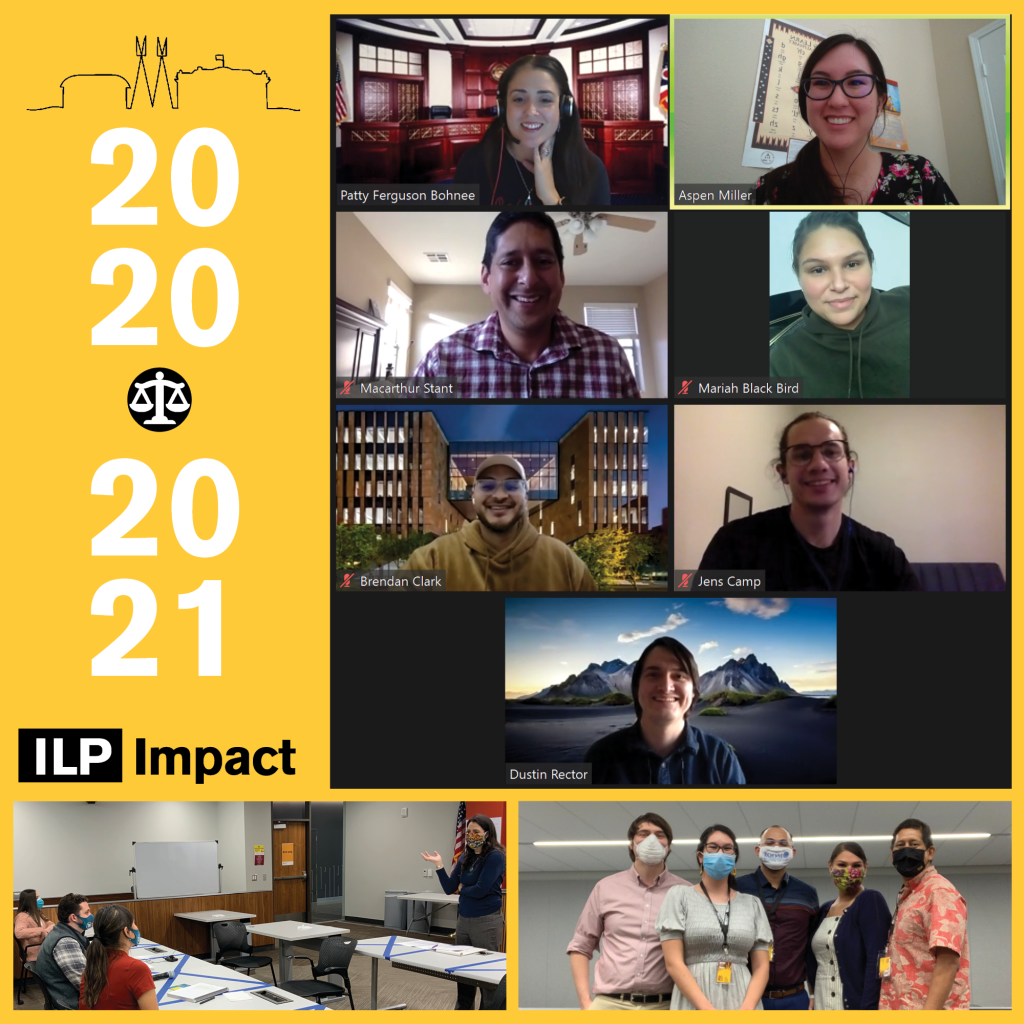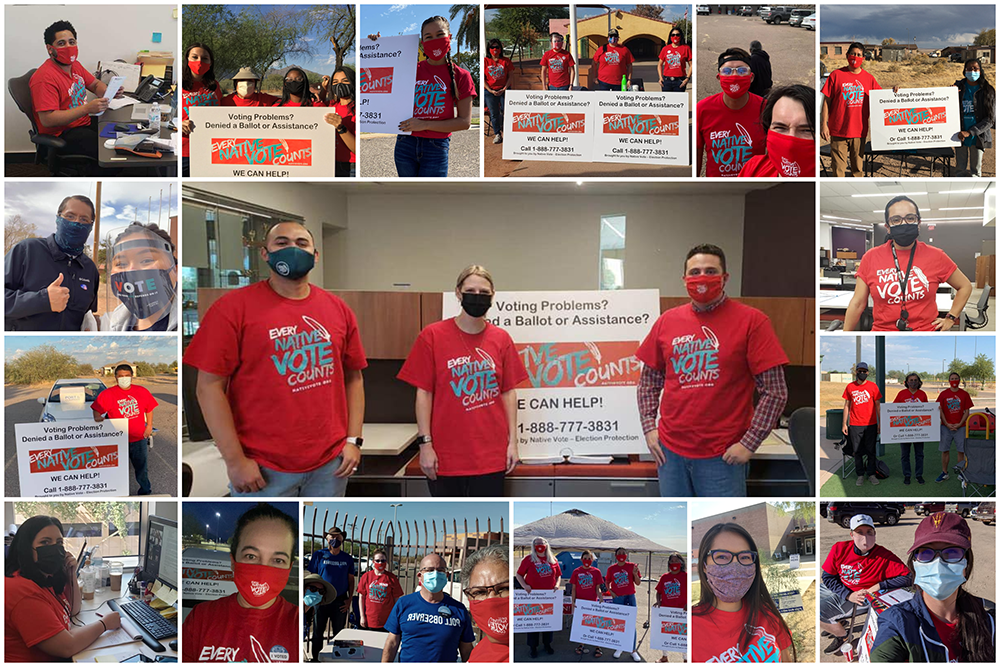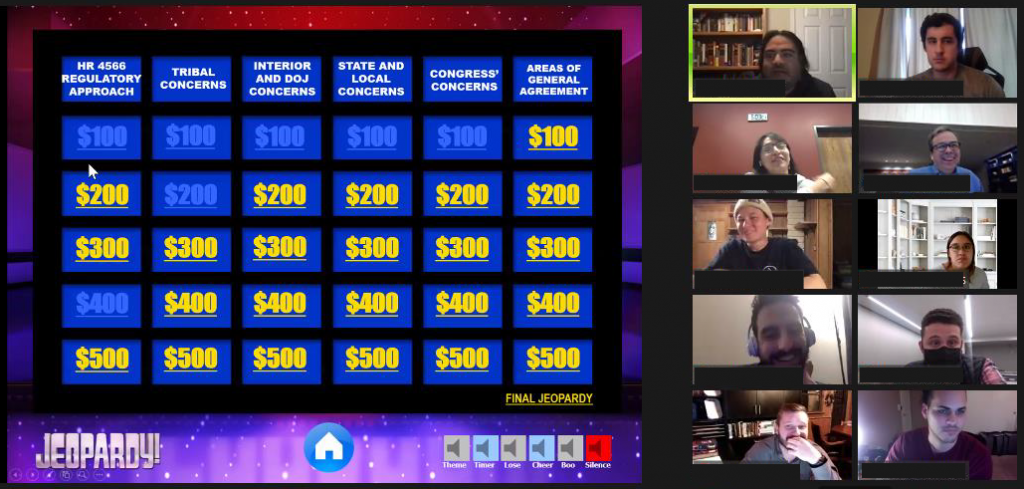Monthly Archives: June 2021
Indian Legal Clinic: Year in Review
The ILC was one of the only clinics at ASU offered to law students to work in-person, which adapted to work remotely with clients during the pandemic. If there is one thing thing to take away from this last year, it is that the ILC takes nothing for granted. Ten student attorneys, including two students that returned for a second semester, billed over 3,000 hours.
The ILC worked on 18 cases plus offered two wills clinics. Overall case subject matters included: civil, criminal, family, probate, civil rights, enrollment, land, and federal recognition. The ILC represented clients in tribal, state and federal courts, including filing a brief in the 9th U.S. Circuit Court of Appeals.
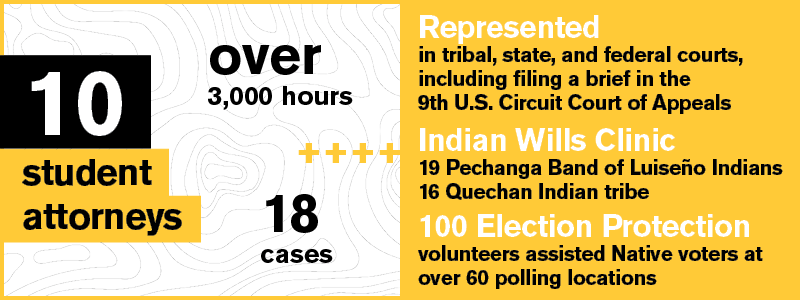
Student attorneys continued the Indian Wills Clinic partnerships with the Pechanga Band of Luiseño Indians and the Quechan Indian Tribe to draft estate planning documents under the direction of Professor Helen Burtis (’07). In October, 3L’s Mariah Black Bird, Jens Camp, Brendan Clark, Aspen M. Jensen, Dustin Rector and MacArthur Stant II executed 19 wills, financial powers of attorney, and health care powers of attorney for 14 members of the Pechanga Band of Luiseño Indians. In March, Brianna Minjarez (2L), Cierra Moore (2L), Vinnie Amato (2L) and Camp created 16 wills for members of the Quechan Indian Tribe.
“With online learning and not seeing as many people in person, it has been hard to stay cause-connected,” said Amato, one of the participating students. “Being able to help draft wills for tribal members over Zoom was a great experience because it refocused me on why I joined the Indian Legal Program. I also gained valuable skills I never would have received otherwise.”
“It was fun to get to know and offer guidance to the student attorneys, whose shoes I was in in the not-so-distant past,” said Simon Gertler (’18) attorney at Rosette, LLP who assisted as a supervising attorney. “It also served as continuing education for me in an area of law that I don’t normally practice. The best part was seeing the clients so appreciative of the students for helping them with their wills! I hope to continue being part of this special program.”
These wills clinics are designed to provide allotment owners with wills that conform to the provisions of American Indian Probate Reform Act.
2020 was a pivotal election year, especially for Arizona and Native voters! The Arizona Native Vote Election Protection Project (AZNVEP) worked tirelessly with partners—the Arizona Election Protection Coalition, the Inter Tribal Council of Arizona (ITCA), All Voting is Local, and the Native American Bar Association of Arizona (NABA-AZ)—to encourage and assist Native voters in the months leading up to the general election despite pandemic challenges. The ILC team included Native Vote Fellow Torey Dolan (’19), and 3L student attorney leads Clark and Rector, and 3L attorneys Camp, Jensen, Stant and Tarman under the supervision of Professor Patty Ferguson-Bohnee. Students even advocated for voting rights through litigation.
The ILC worked with outside counsel to prepare an affidavit that was filed on election day to extend polling place hours and require polling locations on the Navajo Nation that opened late to also remain open late.
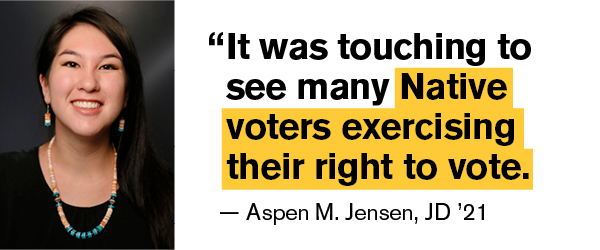
“Working in Chinle, Arizona with Native Vote during the 2020 election was my favorite memory in the ILC,” said Jensen. “It was touching to see many Native voters exercising their right to vote. I saw voters from before sunrise to after sunset. Some of my favorite memories of that day were seeing grandmas and grandpas wrapped up in blankets standing in line before the polls opened, helping a man who biked five miles and asked me to watch his bike while he voted, and helping a woman who stood firm after she was told the polls had closed but steadfastly held her rightful place in line until she eventually voted.”
On Election Day 2020, 100 Election Protection volunteers assisted voters at over 60 polling sites across Arizona and answered over 250 calls through the Native Vote Election Protection hotline. The ILC also worked with the Pascua Yaqui Tribe, the Campaign Legal Center, and Osborn Maledon to bring suit against the Pima County Recorder to restore early voting access.
Student attorneys researched and wrote “Decolonizing the Mindset,” a white paper on the inherent sovereignty of non-BIA listed Tribes. During their 2L year, Nathan Frischkorn and Tarman began drafting the paper in Spring 2020 and Tarman continued to work on it this year. Clark and Jensen prepared a brochure to accompany the white paper that can be used for educational purposes.
Last autumn, Jensen presented on “Decolonizing the Mindset” to the NCAI Federal Recognition Taskforce during the NCAI Annual Meeting. This spring, Tarman presented her paper to the Alliance of Colonial Era Tribes (ACET). ACET issued a certificate of appreciation to the Indian Legal Clinic for “Outstanding Service to the Cause of Justice for all Indigenous nations and working to decolonize the minds of Indigenous and non-indigenous Americans.”
Frischkorn (3L) and Jasmine Blackwater-Nygren (’20) with the guidance of April Olson (’06) assisted in drafting NABA-AZ’s comment in support of the Arizona Supreme Court amending its pro hac vice rules to allow nonmember attorneys representing Indian Tribes in Indian Child Welfare Act cases to appear without paying the pro hac vice fees or associating with local counsel. The amended Rule 39(a) went into effect January 1, 2021.
The ILC recently filed a brief in the Ninth Circuit Court of Appeals regarding the overreach of federal court jurisdiction in tribal affairs. Camp was the lead student attorney on the brief. During the semester, he and Amato assisted with pleadings filed with the District of Alaska in support of a motion to set aside a default judgment for lack of subject matter jurisdiction.
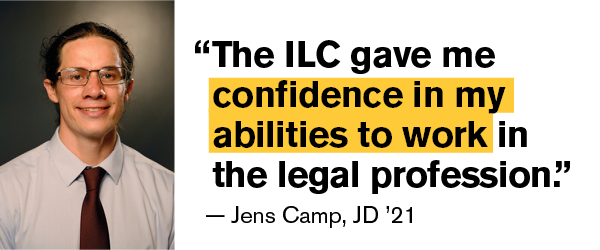
“The ILC gave me confidence in my abilities to work in the legal profession,” said Camp. “Thank you for being such an amazing teacher and mentor, Professor Ferguson-Bohnee! I will always appreciate how you treated the ILC student attorneys as colleagues and pushed us beyond our comfort zones. Clinic taught me more than any other course I took in law school, and I largely attribute this experience to your leadership.”
Returning student Camp received the International Academy of Trial Lawyers Award in recognition of his outstanding trial advocacy and clinical work. Earlier in the year, Camp helped draft a public comment for the National Congress of American Indians to proposed regulatory changes to the definition of habitat under the Endangered Species Act.
____
Honore Callingham (’18)
Law Fellow, Indian Legal Clinic, ASU Law
Torey Dolan (’19)
Native Vote Fellow, Indian Legal Clinic, ASU Law
Danielle Williams
Program Coordinator Sr, Indian Legal Program, ASU Law
Job Opportunity – Navajo Superior Court Position
The Office of the Governor will review applications and interview selected applicants for the vacancy, and Governor Doug Ducey will appoint the new judge pursuant to Article VI, Section 12 of the Arizona Constitution.
Requirements: Applicants must be at least 30 years of age and less than 65 years of age, of good moral character, admitted to the practice of law in Arizona, a resident of Arizona for the past five years, and a resident of Navajo County for the past year pursuant to Article VI, Sections 22 and 37 of the Arizona Constitution
The judicial application form can be downloaded online at the Office of the Governor’s website: https://azgovernor.gov/judges.
McGirt v. Oklahoma Supreme Court Decision: Treaties Upheld
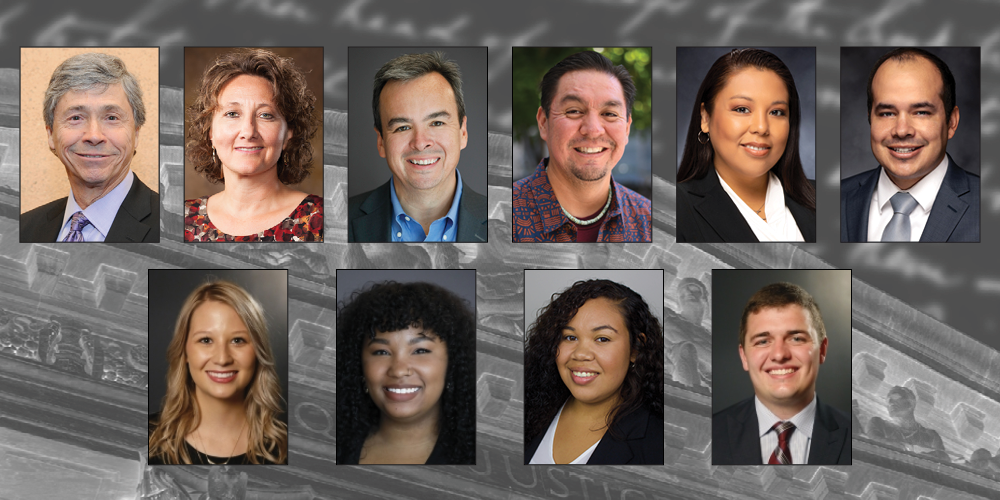
On July 9, 2020, the Supreme Court issued its decision in McGirt v. Oklahoma and affirmed that the Muscogee Creek Nation’s reservation was never disestablished. The majority opinion strongly affirmed what Native people have known: Treaty rights are the Supreme Law of the land and do not fade with time. This historic decision is a strong vindication of the Muscogee Creek Nation’s treaty and a promising decision for all treaties.
In their 2L year, Dylan West (Choctaw) and Blair Tarman (Chickasaw) assisted Professor Stacy Leeds (Cherokee) on the Cherokee Nation’s amicus brief. Read the amicus brief on behalf of Cherokee here. Professor Leeds was the Salt River Pima-Maricopa Indian Community distinguished visiting Indian Law professor at ASU Law during Fall 2019 semester and taught Federal Indian law.
From this monumental and victorious decision, people of the ILP quickly took action and poured their energy into their work.
In his interview with the Voice of America (VOA) News, Professor Robert Miller (Eastern Shawnee) stated, “The Court is upholding this 1832 treaty that the Creek Nation signed with the United States, and is holding the United States to those promises.” Watch full video here. Miller also presented, “McGirt v. Oklahoma: Understanding the Decision and its Implications for Indian Country” for the Oregon Historical Society. Watch Miller’s presentation here.
Professor Larry Roberts (Oneida) said, “today’s decision is a significant win for the Muscogee (Creek) Nation and for Tribal Nations across the country. With the Muscogee (Creek) Nation facing opposition from the Trump Administration, this Court made clear that treaties mean something – that they are the supreme law of the land,” in his article for ASU’s American Indian Policy Institute blog. Read blog more here.
“This opinion was not given without opposition, nor does it bar Congress from breaking the treaties in the future,” said rising 2L Taylor Norman (Muscogee Creek). “What it does mean, however, is that rather than kneel to lazy reasoning or racist objection, the Supreme Court of the United States did not break any treaties today.” Read Norman’s full piece here.
Joe Keene (’12) (Osage) and Candace French (’17) (Wichita and Affiliated Tribes) recently published an article for Sacks Tierney P.A. summarizing the McGirt case. Read the article here.
The McGirt decision sparked many conversations across Indian Country and to help bring further awareness and understanding, the Indian Legal Program hosted a case overview. “The most significant Indian Law case of the century: McGirt v. Oklahoma” webinar was held on Thursday, July 23.
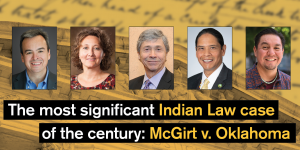
- Professor Larry Roberts (Oneida) – Moderator, Executive Director of the Indian Gaming and Tribal Self-Governance Program and Professor of Practice at the Sandra Day O’Connor College of Law
- Stacy Leeds (Cherokee) – Vice Chancellor for Economic Development, Dean Emeritus and Professor of Law at the University of Arkansas
- Professor Robert Miller (Eastern Shawnee) – Faculty Director, Rosette LLP American Indian Economic Development Program and Pedrick Distinguished Research Scholar at the Sandra Day O’Connor College of Law
- Jonodev Chaudhuri (Muscogee Creek Nation) – Ambassador, Muscogee Creek Nation, Partner, Quarles & Brady
- Derrick Beetso (’10) (Navajo) – General Counsel, National Congress of American Indian
In November, 1L Ashleigh Fixico (Muscogee Creek Nation) presented on a panel “We Hold the Government to Its Word: A Conversation about McGirt v. Oklahoma.”
Since the McGirt decision, ILP’s Federal Indian law experts Professor Leeds and Professor Miller have been called for consultation.
Three weeks after the McGirt decision, Leeds was appointed a judge for the Muscogee (Creek) Nation—the tribe whose boundaries were affirmed in the decision—and continues to hear cases there throughout the year. She also published two articles about the McGirt decision, one dealing with Supreme Court trends and one dealing with Indian taxation.
Professor Miller who not only published his articles, also presented multiple times. Review the full list of his participation here.
This opinion was released during great strife due to the COVID-19 pandemic and continuing racial injustice, but it has brought renewed hope that in this modern era of self-determination for Indian Country the courts will continue to vindicate the rights our ancestors thoughtfully secured for us.
____
Torey Dolan (’19)
Native Vote Fellow, Indian Legal Clinic, ASU Law
Danielle Williams
Program Coordinator Sr, Indian Legal Program, ASU Law
Professor Miller and the McGirt case
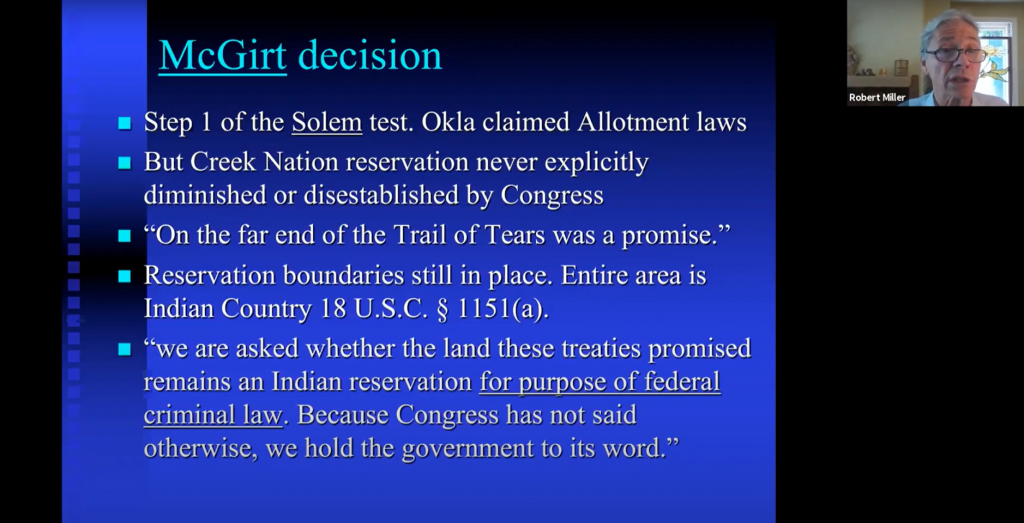
It’s almost been a year since the Supreme Court issued its decision in McGirt v. Oklahoma on July 9, 2020 and affirmed that the Muscogee Creek Nation’s reservation was never disestablished. The majority opinion strongly affirmed what Native people have known: Treaty rights are the Supreme Law of the land and do not fade with time. This historic decision created dialogue and research for Indian Country, especially for Federal Indian Law experts like Professor Robert J. Miller. It’s been “all McGirt, all the time,” he says.
2020
On July 12, 2020 Professor Miller was quoted in the Arizona Republic article on the McGirt case. Read article here.
On July 14, Professor Miller along with Professor Larry Roberts, presented on McGirt case to the ILP students.
On July 23, the Indian Legal Program at the Sandra Day O’Connor College of Law at ASU hosted, “The Most Significant Indian law Case of the Century: McGirt v. Oklahoma,” webinar that offered an in-depth case overview, ” which included presenters: Professor Miller, Professor Stacy Leeds, Derrick Beetso (’10), Ambassador, Muscogee Creek Nation Ambassador Jonodev Chaudhuri and moderated by Professor Roberts. View the recording here.
On July 30, Professor Miller gave a two-hour Indian law training for the U.S. DOE Bonneville Power Administration and discussed McGirt case at length.
In July, Professor Miller stated, “The Court is upholding this 1832 treaty that the Creek Nation signed with the United States, and is holding the United States to those promises” during his interview with the Voice of America (VOA) News. Watch full video here.
Professor Miller also presented, “McGirt v. Oklahoma: Understanding the Decision and its Implications for Indian Country” for the Oregon Historical Society. Watch Miller’s presentation here.
On August 4, Professor Miller co-presented a McGirt webinar for the American Indian Community House in New York City.
On August 31, Professor Miller presented on his upcoming paper “The Indian Law Bombshell: McGirt v. Oklahoma” to law school faculty. Co-author Native Vote Fellow Torey Dolan (’19) joined the discussion. Miller and Dolan published their law review draft article, “The Indian Law Bombshell: McGirt v. Oklahoma” in the SSRN. Read the draft article here.
Professor Miller drafted an 800-word blurb on the McGirt decision for the American Association of Law Schools’ (AALS) Indigenous Nations section newsletter.
On September 15, Professor Miller was a guest on the daily radio program Native America Calling to speak about the McGirt case. Listen here.
On September 17, Professor Miller was a panelist on a 90-minute Zoom conference for the Northeast Corporate Counsel Organization Diversity & Equity Committee and he spoke about the McGirt decision and its impact on corporate clients in Oklahoma.
On October 26, Professor Miller spoke on a panel session about McGirt for Boston College Law School.
On November 4, Professor Miller gave a keynote speech on McGirt for the “American Society for Ethnohistory Annual Conference” at University of North Carolina.
On November 13, Professor Miller participated in the Oregon State Bar CLE panel and discussed the McGirt case.
On November 19, Professor Miller presented a one-hour speech for the American Philosophical Society on the McGirt case. Watch the recording here.
On December 11, Professor Miller gave a presentation on his current research on the landmark Supreme Court decision in McGirt v. Oklahoma for ASU’s Indigenous Research Roundtable (IRR).
2021
On Febuary 26, 2021, Professor Miller and Dean Elizabeth Kronk-Warner gave a luncheon talk on McGirt at the George Washington School of Law.
Professor Miller and Professor Robbie Ethridge from University of Mississippi signed a contract to write a book on McGirt for the University of Oklahoma Press.
In April, Professor Miller and Torey Dolan (’19) published their law review draft article, “The Indian Law Bombshell: McGirt v. Oklahoma” in the SSRN. Read the draft article here.
Professor Miller published two short essays for the University of Pennsylvania School of Law’s Regulatory Review journal on the McGirt case and private sector economic development on reservations.
Professor Miller published the 5,500 word cover article “McGirt v. Oklahoma: The Indian Law Bombshell.” in the April edition of the Federal Lawyer magazine for the Federal Bar Association.
Professor Miller and Torey Dolan (’19) accepted an offer to publish their article “The Indian Law Bombshell: McGirt v. Oklahoma” in 101 Boston University Law Review (2021).
Alumni: Taking the Oath in a Pandemic
Meet some of ILP’s alumni who were determined to make change. They care about the greater good and have positioned themselves to hold public spaces and have committed their efforts to public service.
In March, April Olson (’06) was named the Chief Judge for the Tolowa Dee-ni’ Nation in California. Congratulations, April!
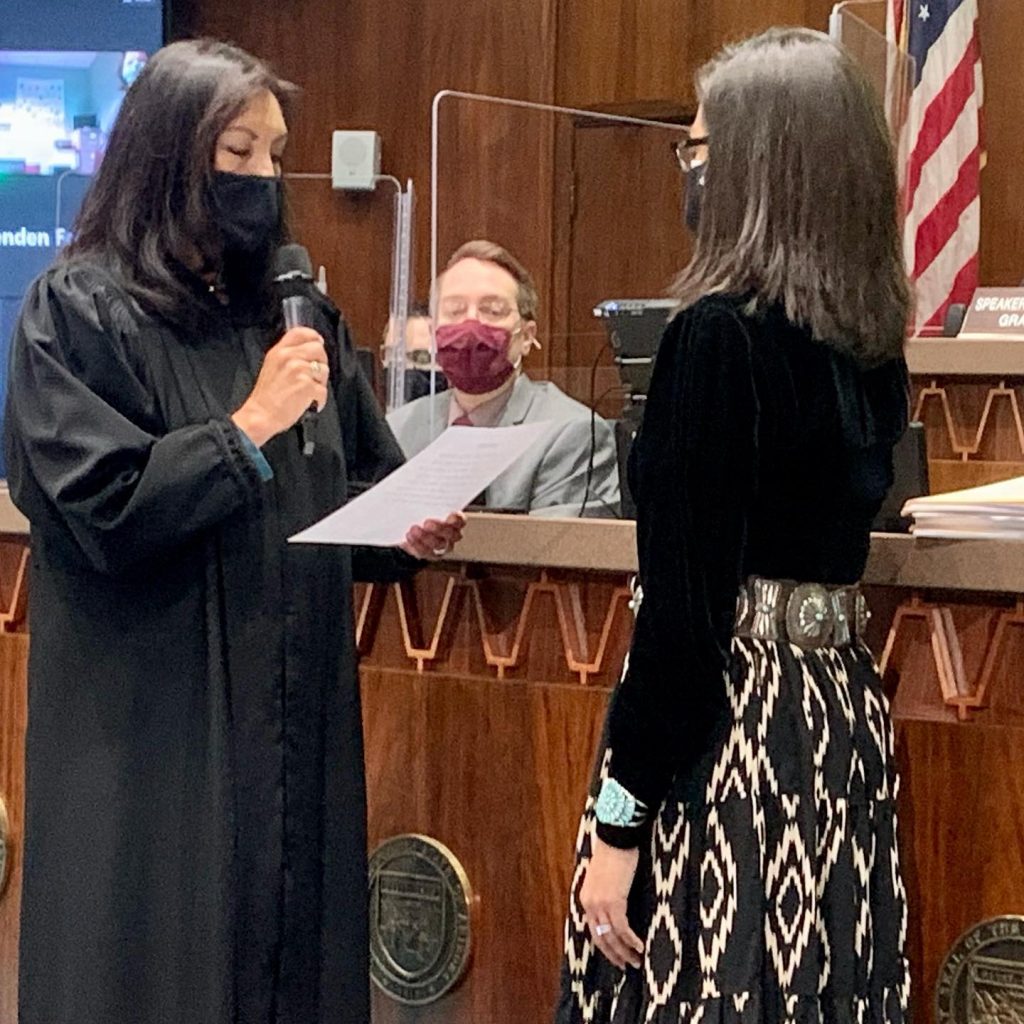
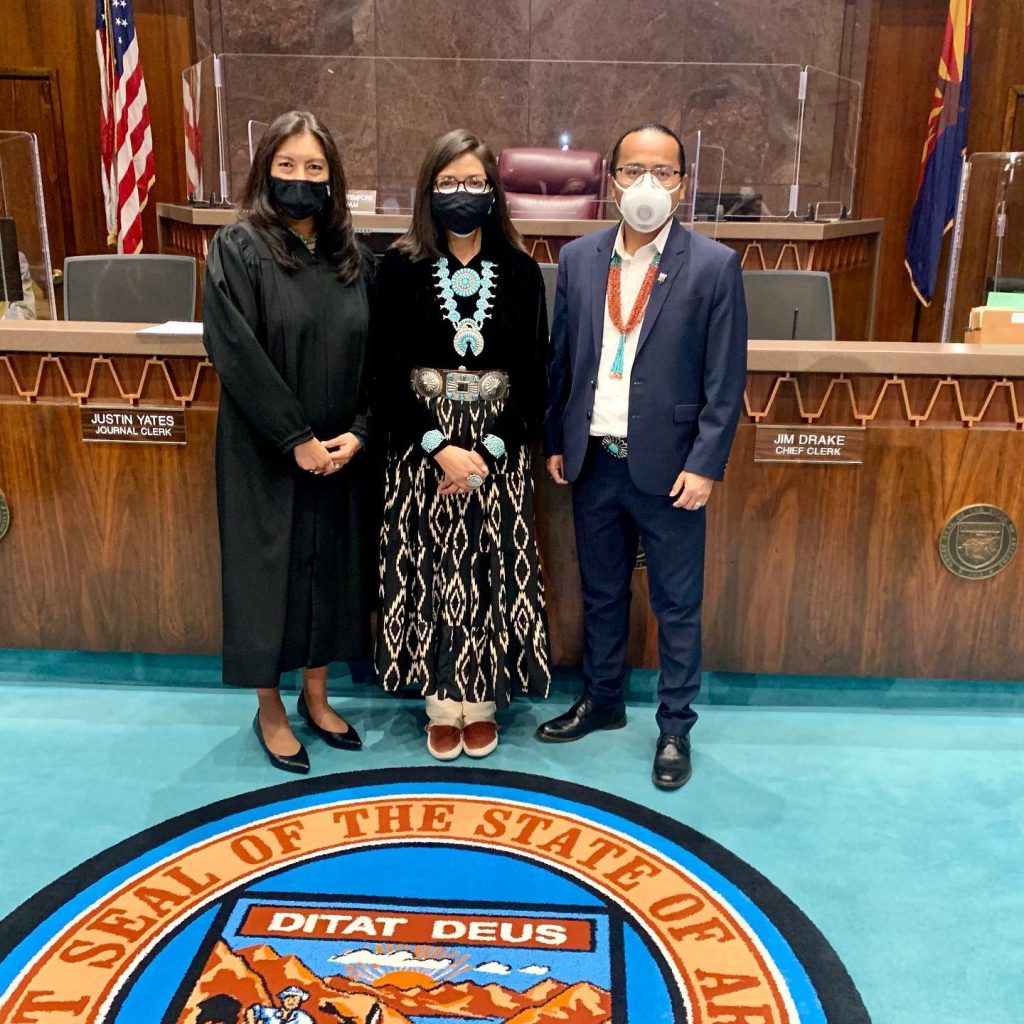
Jasmine Blackwater-Nygren (’20) was appointed to represent District 7 of the Arizona State House of Representatives and is the youngest member of the House. Who better to conduct her swearing in than the first Native American woman federal judge and fellow ILP alum? Representative Blackwater-Nygren was sworn in by Judge Diane Humetewa (‘93) of the District of Arizona on Feb. 11.
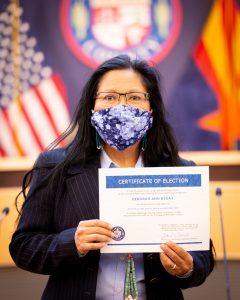
On Jan. 8, Moon Valley Justice of the Peace Deborah Ann Begay (’10) took her oath of office, which was administered by Navajo Nation President Jonathan Nez.
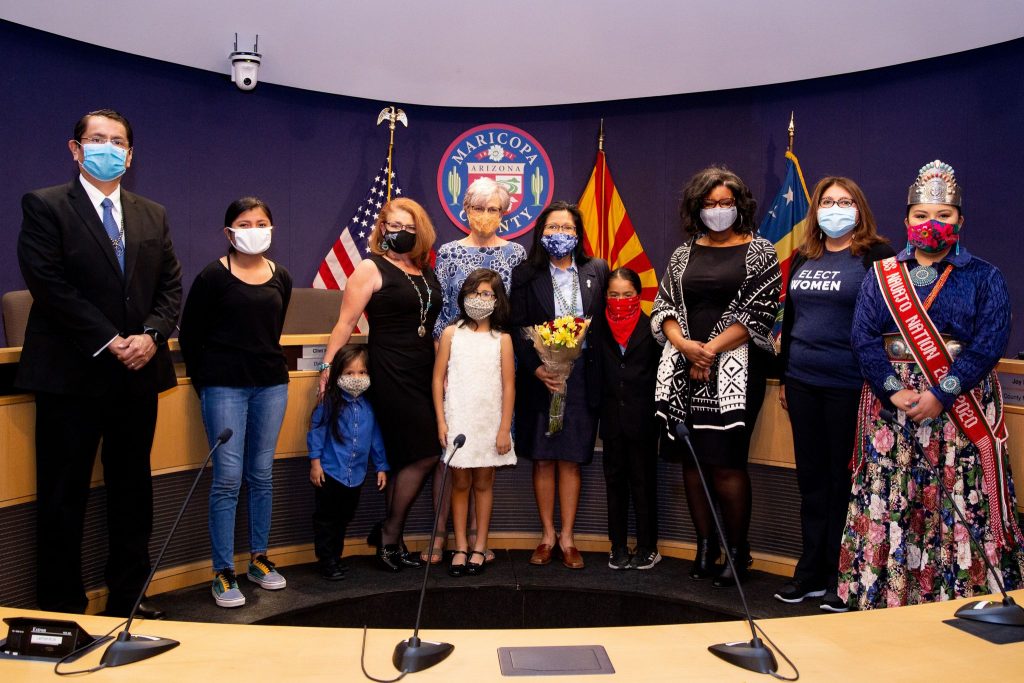
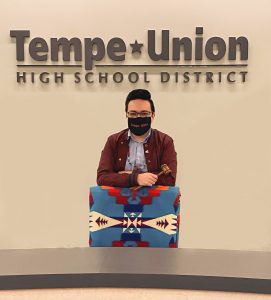
In January, Brian Garcia (’20) was sworn in as president of Tempe Union School Board. Congratulations Brian!
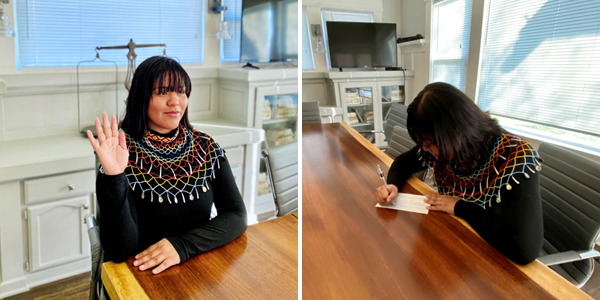
Janet Bill (’20) was sworn into the State Bar of California on Jan. 21. Congratulations, Janet!
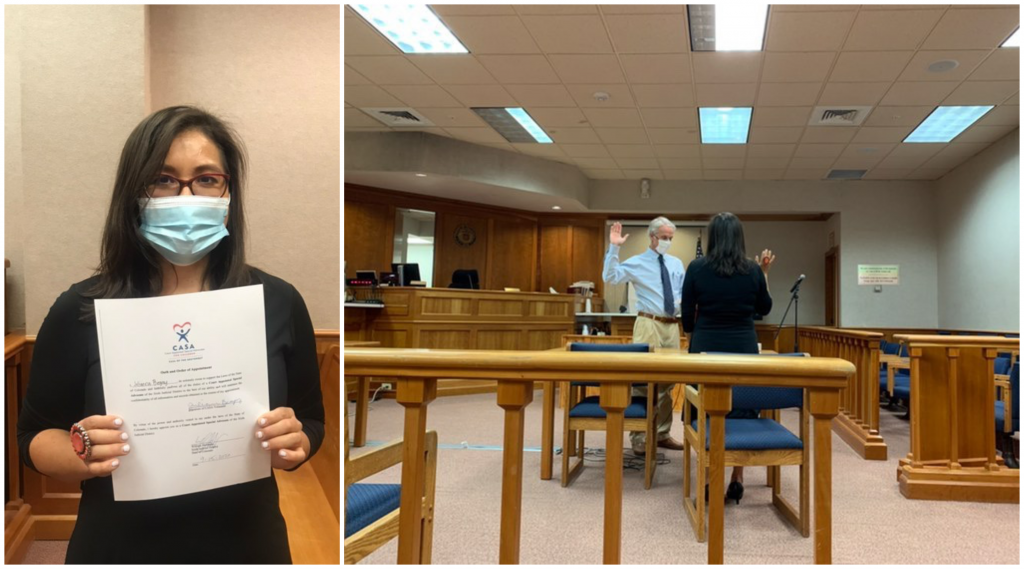
In October 2020, Julianne Begay (’15) was sworn in as a Court Appointed Special Advocate (CASA) for the 6th Judicial Advocate for children in dependency and neglect cases. Excellent advocacy, Julianne!
ASU Navajo Nation Law CLE 2021: Call for Presentations
The Indian Legal Program at ASU Sandra Day O’Connor College of Law is proud to host the 2021 Navajo Nation Law CLE Conference on Friday, October 15, 2021.
The Navajo Nation Law CLE Conference will offer a one day survey of Navajo law and ethics. This conference is ideal training for attorneys practicing on and near the Navajo Nation, tribal court advocates, tribal court practitioners, tribal court
prosecutors, tribal court defenders, tribal council members, Indian law
attorneys, tribal liaisons, government legislators, Navajo Nation Bar members,
law students, as well as teachers/professors and students of American Indian
studies.
The Conference Planning Committee welcomes proposals for 30-minute, 60-minute or 90-minute conference presentations or panel discussions. To submit a presentation proposal, please send the following information by July 30, 2021:
- Presenter(s) name, title, contact information, bio
- Title of the proposed presentation
- A brief (one paragraph) description of the presentation, how the presentation relates to Navajo Law, and a description of the presentation format (example: lecture with Q&A, panel discussion, etc.)
- A brief description of what will be or could be distributed to attendees as materials
- A two-sentence summary of the presentation for the conference program, if accepted
- Length of presentation
- Would this session qualify for Navajo Ethics?
Participants will be notified of their selection by August 13, 2021.
Please submit your abstract here: ilp@asu.edu Subject: Navajo Law CLE Proposal
Impacting the next gen
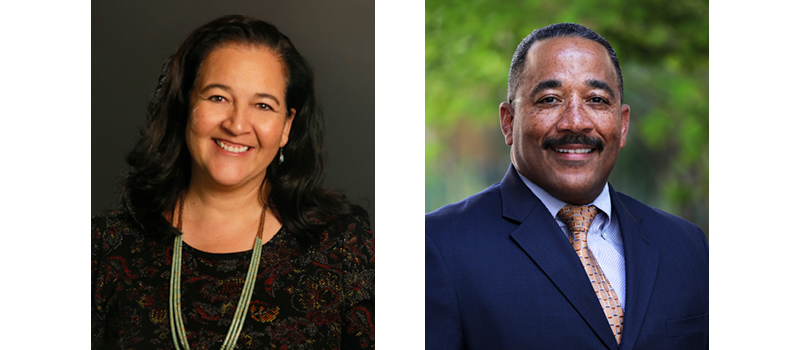
This past semester ILP Executive Director and Assistant Dean of Institutional Progress Kate Rosier and Assistant Dean Ray English of ASU Law’s Office of Career and Employment Service joined forces to co-teach an undergraduate course LAW 394: Law School Foundations. The course was created to provide students with the opportunity to explore and develop the skills necessary to apply to law school and succeed in law school. This diverse roster took part in an intensive LSAT preparation course, and students learned about the law school application process and application strategies. They were also given the opportunity to network with law school administrators, law students, lawyers and judges.
“I feel like the course provided students with a great foundation upon which to develop their critical thinking skills and to pursue admission into law school,” said English. “My favorite memories surround oral arguments. Students did amazingly well, considering many had never made an oral argument before.”
Over the course of the semester, the students were exposed to legal constructions of the courts in the United States and Arizona, including the function of courts and judges. Students participated in legal analysis exercises, draft legal memorandums and made oral arguments.
“It was a rewarding experience to work with talented and motivated students in the class,” said Rosier. “It was fun to demystify the law school admissions process and direct them with helpful tips.”
The course was initially designed to be in-person but due to a global pandemic, Rosier and English quickly took action and reworked the course to meet the needs of the students. By the end of the semester, they realized the course exceeded their expectations. “Kate and I make a great team! I am looking forward to working with her to improve the course.”
“I think the biggest accomplishment is that all of the students attended every session, even though I made everyone turn on their cameras,” he said. By the end of the semester, two students secured summer internships with Honorable David B. Gass of the Arizona Court of Appeals, Division One.
This course was based on the course previously taught by Jeremiah Chin (’15) and Dr. Bryan Brayboy. We appreciate their great work and forward thinking.
Make learning Indian Gaming Law fun
This semester, Professor Larry Roberts brought game to his Indian Gaming Law class! In a public health crisis, students turned on their webcams and tuned into class at 3:45 p.m. every Tuesday to learn about Indian Gaming Law from Professor Roberts, who tuned in from Washington, D.C. The class examined the historical background behind Indian gaming and the modern legal regime that governs the development of gaming enterprises in Indian country.
To make it interesting and get the students excited about learning, Professor Roberts challenged his class to Jeopardy and Family Feud. Student teams applied their knowledge and reviewed Indian gaming regulatory history while playing Jeopardy and a fast game of Family Feud.
Jeopardy was neck and neck until the very end. Team 1’s Peter Furlow (2L) and Team 2’s Zaine Ristau (2L) faced off in final jeopardy. Team 1 won Jeopardy by the narrowest of margins: one dollar. Pro tip for those who haven’t played Indian Gaming Jeopardy: if you don’t know the answer, go with “What is the Secretary of the Interior?”
The class ran through two lightening rounds of Family Feud, reviewing the components of HR 1920 and dissenting views of HR 1920; the game ended in a tie. But the class wasn’t all games, they continued on to discuss the Indian Gaming Regulatory Act and its legislative history.
____
Theresa Beaulieu
Program Coordinator, Indian Legal Program, ASU Law
Danielle Williams
Program Coordinator Sr, Indian Legal Program, ASU Law
Job Opportunity – Intergovernmental Affairs Liaison
Rapid City, South Dakota
Job Summary:
This position will have both internal and external facing responsibilities to advance the mission of GPTCHB through excellence in regulatory tracking, policy, advocacy, outreach, technical assistance, research and related projects. This position oversees the interactions of the GPTCHB with tribal, federal and state governments and agencies in addressing all issues affecting health care in the Great Plains Area, and will assist with efforts to advocate for Indian health. This position will be responsible for tracking and responding to federal health policies and regulations as they impact Indian Country. The Intergovernmental Affairs Liaison will establish and strengthen ties and relationships with tribal councils, chairpersons, officials, staff, and tribal members in the OHC Service Area. The incumbent must have a strong understanding of health care delivery, the federal trust relationship with Indian Tribes as well as the legal, policy and political frameworks impacting Direct Service and Self-Governing Tribes as well as compacting and contracting Tribes, and this position is expected to understand the intricacies of how tribal political bodies, including the Councils and their Committees, and the tribal executive branches work.
EDUCATION/EXPERIENCE/CERTIFICATES/CREDENTIALS
- Minimum education required is graduate or doctorate degree in Law, public policy/government, public administration or other relevant field; Juris Doctorate preferred.
- A minimum of five (3) years’ of experience in the Indian health care delivery system working with American Indian/Alaska Native tribal governments with demonstrated experience with policy analysis and development, research, project management and community engagement, and federal policy advocacy, working with Congress and the Administration.
- Demonstrated analytical skills.
- Excellent verbal and written communication skills with the ability to be detail oriented. Computer and technical skills (including Word, PowerPoint, Excel, Outlook, etc.).
- Experience that indicates the ability to interact effectively with leaders among American Indian communities, government agencies, scientific and academic communities, medical and health-related organizations, nongovernmental groups and the public at large is required.
- Must successfully pass a criminal and background check, and a pre-employment drug screen.
Essential Functions:
Specific duties include, but are not limited to:
- Develop and maintain strong relationships with key partners, networks, coalitions, organizations, and other GPTCHB partners critical to the achievement of the organization’s legislative agenda; convene and regularly communicate with an array of tribes and national, regional, and tribal organizations focused on a broad range of policy priorities.
- Build relationships with Congressional and Administration contacts that are necessary to further the overall mission and responsibilities of GPTCHB, including interaction with tribal partners, federal partners, national and regional organization partners, constituent inquiries, and correspondence.
- Attends meetings of groups and individuals affected by the GPTCHB programs and build positive partnerships.
- Assist in development of strategies for GPTCHB discussions and negotiations with represented tribal governments to create mutually beneficial agreements and partnerships.
The GPTCHB is a tribal organization which follows tribal preference laws. It is our policy to give preference to qualified Indian/Tribal candidates overqualified non-native candidates in hiring decisions, if all other qualifications are equal.
See the full job description and apply here.


